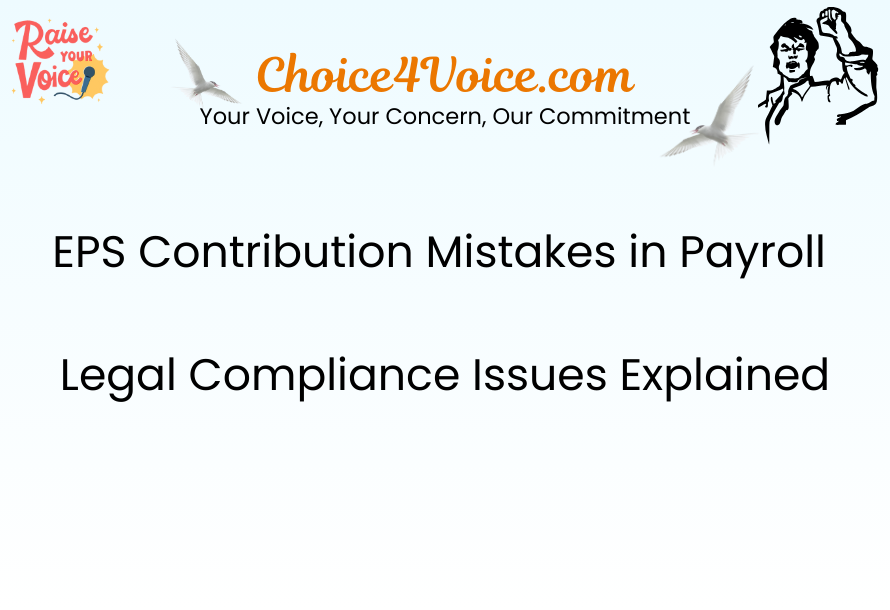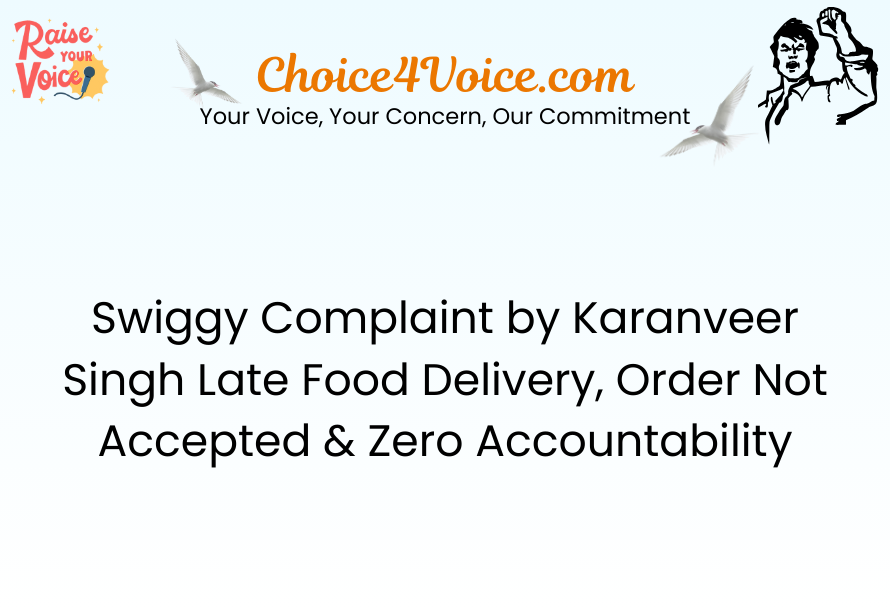If you’re experiencing this problem with this brand or any other company, submit your complaint and we may feature it on Choice4Voice.com.
Submit your complaint →Many companies wrongly split PF contributions into EPF and EPS for employees earning above ₹15,000 basic salary. Choice4Voice.com highlights this compliance violation, explains laws, legal actions possible, and how affected employees can seek remedies.
EPS Contribution Compliance Mistake in Payroll
At Choice4Voice.com, we bring attention to payroll and compliance violations that directly impact employees. This case highlights a serious issue where companies wrongly split the employer’s contribution into EPF and EPS for employees with a basic salary above ₹15,000, which is not permitted under the law.
Such mistakes not only violate statutory provisions but also expose organizations to compliance risks, penalties, and employee disputes.
Complaint Summary
| Details | Information |
|---|---|
| Complainant Name | Akshay Jadhav |
| Company/Brand | Not Disclosed (Generic Payroll Observation) |
| Complaint Type | Payroll Compliance Violation |
| Issue Description | Employer’s PF share wrongly split into EPF + EPS for employees earning more than ₹15,000 basic salary. |
| Applicable Law | EPF & MP Act, 1952 (Post 2014 Amendment) |
| Impact | Wrong EPS deductions, incorrect filings, potential penalties, and employee disputes. |
| Complainant Profession | Assistant Manager – Human Resources |
About the Complainant
The concern has been raised by Mr. Akshay Jadhav, an HR professional with over 6 years of experience in Payroll, Employee Benefits, and Compliance. He has observed repeated mistakes across organizations where payroll teams and vendors continue to misreport EPS contributions even when not applicable.
Key Compliance Issues Raised
- EPS Salary Cap Ignored: EPS contribution is capped at ₹15,000 basic salary.
- New Members Ineligible: Employees who joined EPF after 1st September 2014 with basic salary > ₹15,000 are not eligible for EPS.
- Wrong Splitting in ECR: Payroll teams often auto-split contributions incorrectly.
- Regulatory Non-Compliance: Leads to false reporting and potential liability during audits.
- Employee Impact: Misreporting can affect employees’ PF balances and pension eligibility.
How Choice4Voice.com is Helping
- Awareness Creation: Featuring this case online to educate HR professionals and employees.
- Guidance to Employees: Explaining rights under PF laws and remedies in case of wrong deductions.
- Legal Escalation Support: Assisting employees in filing complaints with EPFO and labor authorities.
- Public Accountability: Ensuring companies follow compliance strictly to avoid penalties.
Legal Provisions Applicable
- Employees’ Provident Fund & Miscellaneous Provisions Act, 1952
- Defines PF and EPS contributions, salary limits, and eligibility.
- EPF Scheme (Post-2014 Amendment)
- EPS capped at ₹15,000, 8.33% (₹1,250 max).
- Employees joining after 01.09.2014 with salary > ₹15,000 are not eligible for EPS.
- Employees’ Pension Scheme, 1995 (EPS Rules)
- Misreporting EPS entries is a violation of the scheme.
- Labour Laws & Compliance Inspections
- Incorrect EPS filings can attract notices, penalties, and legal scrutiny during inspections.
Departments & Authorities Involved
- Employees’ Provident Fund Organisation (EPFO) – For correcting wrong EPS entries and enforcing compliance.
- Regional PF Commissioner – For initiating action against defaulting employers.
- Labour Department (State/ Central) – For inspection and penalties on non-compliance.
- Consumer/Employee Forums – For recovery and compensation in case of wrongful deductions.
How the Complaint Can Be Resolved
- Immediate Payroll Audit: Organizations should audit past PF returns.
- Correction in ECR Filings: Rectify EPS entries for ineligible employees.
- Refund/Reallocation: Wrong EPS deductions should be transferred fully into EPF.
- Training HR Teams: Educate payroll teams and vendors about EPS eligibility rules.
- Regulatory Reporting: Employers should voluntarily correct past filings to avoid penalties.
Choice4Voice.com’s Next Steps
Publishing this compliance issue is just the first step. If organizations continue to ignore EPS regulations, Choice4Voice.com can assist employees in filing legal cases, such as:
- Complaint to EPFO Commissioner for correction of contributions.
- Petition under Labour Laws for penalties against employers.
- Employee Legal Action for refund of wrong deductions.
- Assistance in Filing Case under Consumer Protection Act, 2019 if employees face loss due to wrongful payroll deductions.
FAQs – EPS Contribution Compliance
Q1. What is the EPS contribution rule under EPF law?
EPS is capped at ₹15,000 salary, with a maximum contribution of ₹1,250/month.
Q2. Who is not eligible for EPS?
Employees who joined EPF after 1st Sept 2014 with basic salary > ₹15,000.
Q3. Can companies split PF into EPF + EPS for such employees?
No, the entire employer contribution should go into EPF.
Q4. What is the common mistake payroll teams make?
They auto-split PF contributions in ECR files, adding EPS entries wrongly.
Q5. What is the impact on employees?
Incorrect PF balances, ineligible EPS entries, and compliance disputes later.
Q6. Which law governs EPS contributions?
Employees’ Provident Fund & MP Act, 1952, and EPS Scheme 1995.
Q7. Can employees demand correction of wrong EPS entries?
Yes, by filing a request with EPFO or raising a grievance on the EPFO portal.
Q8. Can penalties be imposed on employers for EPS mistakes?
Yes, under PF law, penalties and damages can be levied.
Q9. Can employees file complaints directly?
Yes, employees can approach the EPFO or labour department.
Q10. Can Choice4Voice.com help in filing complaints?
Yes, we assist employees in drafting complaints to EPFO and legal notices.
Q11. How can payroll teams avoid EPS errors?
By auditing PF returns, checking eligibility, and updating payroll systems.
Q12. Can wrong EPS entries affect pension benefits?
Yes, incorrect entries may lead to disputes during pension withdrawal.
Q13. Can EPS entries be corrected retrospectively?
Yes, with EPFO’s approval and employer’s correction filing.
Q14. What are the penalties for employers in such cases?
Financial penalties, damages, and stricter labour inspections.
Q15. Does EPFO monitor EPS compliance?
Yes, through periodic inspections and audits.
Q16. Can employees get refunds of wrong EPS deductions?
Yes, the wrongly deposited EPS amount can be redirected to EPF.
Q17. How long does EPFO take to resolve such grievances?
Generally 30–60 days if proper documents are submitted.
Q18. Can this issue be raised in Consumer Court?
Yes, under the Consumer Protection Act, 2019, for service deficiency.
Q19. Can HR professionals be held responsible?
Yes, compliance failures may hold HR/Payroll heads liable.
Q20. How can organizations prevent such mistakes?
By training payroll staff, using updated software, and regular compliance audits.
At Choice4Voice.com, we ensure that compliance violations like wrong EPS deductions do not go unnoticed. Featuring this issue publicly is the first step if organizations fail to act, we will assist employees in filing formal complaints and legal cases for justice.


